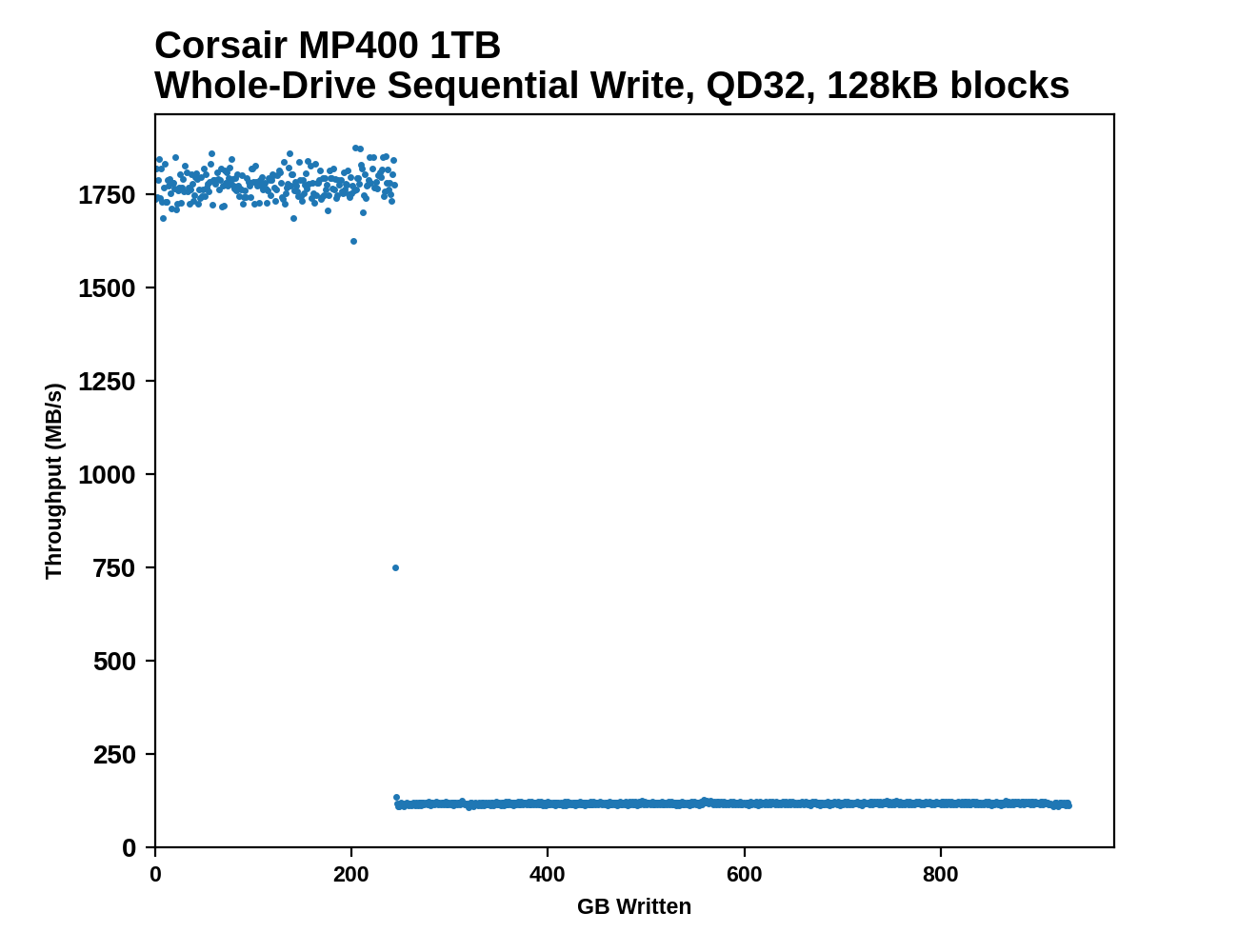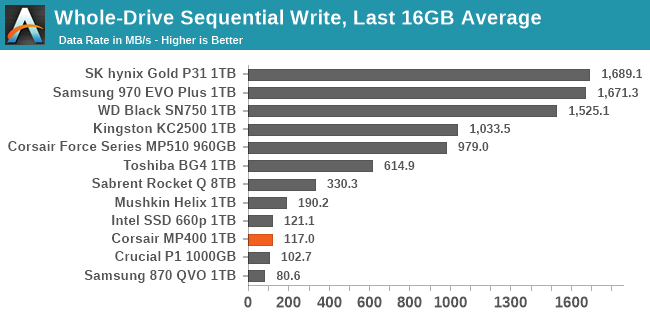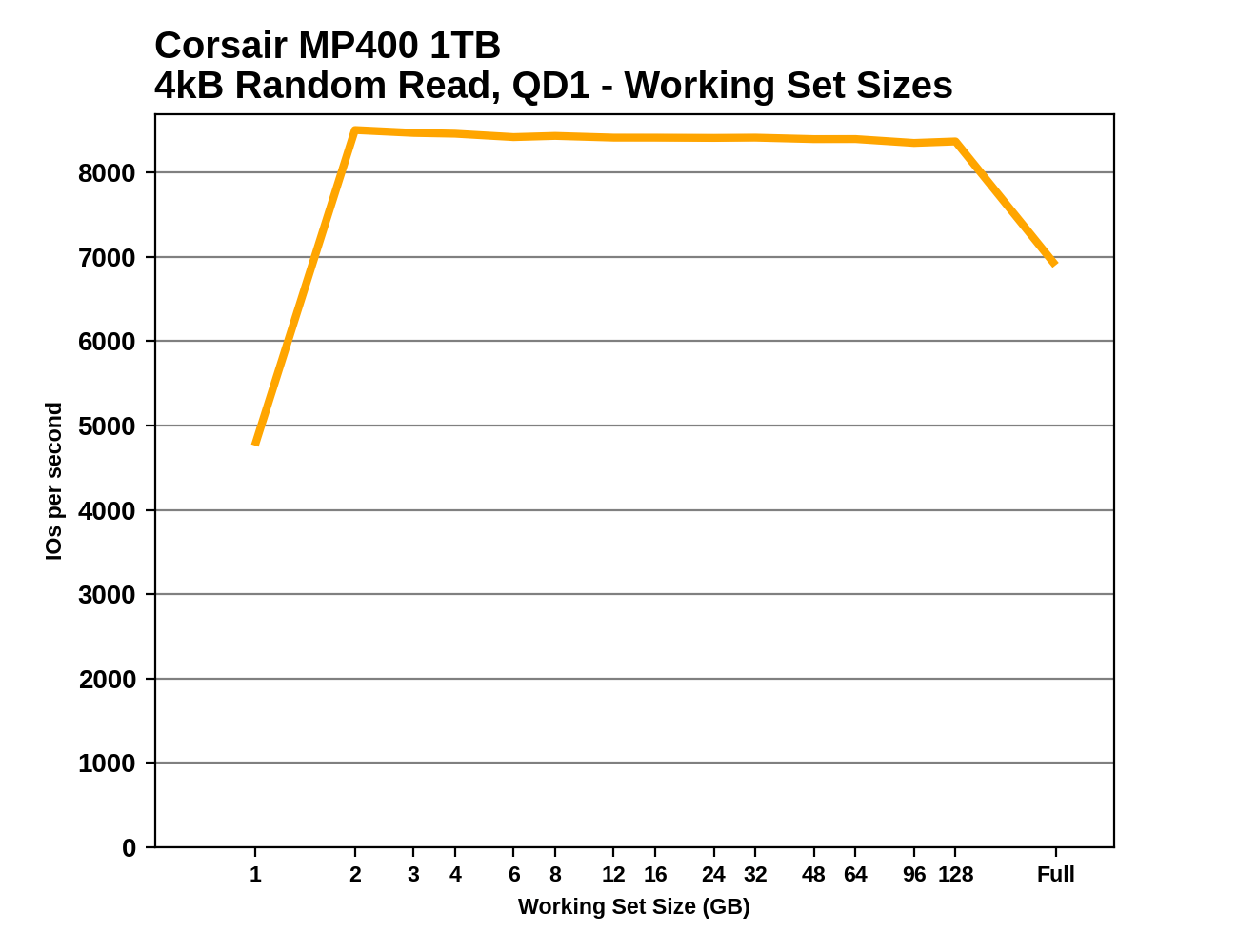The Corsair MP400 1TB QLC NVMe SSD: A Quick Review
by Billy Tallis on December 11, 2020 2:00 PM ESTWhole-Drive Fill
This test starts with a freshly-erased drive and fills it with 128kB sequential writes at queue depth 32, recording the write speed for each 1GB segment. This test is not representative of any ordinary client/consumer usage pattern, but it does allow us to observe transitions in the drive's behavior as it fills up. This can allow us to estimate the size of any SLC write cache, and get a sense for how much performance remains on the rare occasions where real-world usage keeps writing data after filling the cache.
 |
|||||||||
The Corsair MP400 opts for the largest possible SLC cache size, allowing for a quarter of the drive's advertised capacity to be written to the cache before performance plummets. This is the same strategy used by the Sabrent Rocket Q and probably all other QLC drives using Phison controllers. The Intel and Crucial QLC drives based on Silicon Motion's SM2263 controller have somewhat smaller variable-sized SLC caches, while the Samsung QLC SATA drives use the same small SLC cache sizes as their TLC counterparts.
 |
|||||||||
| Average Throughput for last 16 GB | Overall Average Throughput | ||||||||
Overall drive fill performance for the Corsair MP400 is marginally faster than for the other 1TB QLC drives we've tested, but the DRAMless TLC drives and the larger Sabrent Rocket Q are considerably faster. However, all of the budget NVMe drives are clearly much slower for sustained writes than the mainstream and high-end TLC drives.
Working Set Size
 |
|||||||||
The random read latency from the Corsair MP400 is quite similar to what we saw from the 8TB Sabrent Rocket Q, especially for medium to large working sets. The 1TB MP400 doesn't exhibit the same unsteady performance for small working sets as the 8TB Rocket Q, but instead only shows poor performance for the absolute smallest working set size tested.
The performance drop-off when performing random reads across the entire drive is expected and normal, because the Crucial P1 is the only QLC drive in this bunch to include the full 1GB per 1TB of DRAM. Most low-end DRAMless TLC drives will show an even earlier drop in performance, and many of the more mainstream TLC drives that have switched to a lower DRAM ratio will also show the same drop that the Rocket Q and MP400 show.










75 Comments
View All Comments
DZor - Friday, December 11, 2020 - link
Today's drives have less and less endurance.This Corsair 1TB model just 200TBW
For example Samsung 860 EVO is 600TBW!!!! Three times longer!!!
rozquilla - Friday, December 11, 2020 - link
Agree, it is an almost disposable storage device. On the other hand an average office/web user will not reach this level of writes for years, but somebody using NVMe drives in RAID for content creation will need to have like an ammo box of these drives nearby to keep swapping drives.Tomatotech - Friday, December 11, 2020 - link
Maybe, maybe this type of drive, at this price point, isn't aimed at 'content creators'. Anyone earning a living off content creating is going to be using rather more expensive tools. Looks perfectly fine for the average user.In the recent Anandtech review of the QLC 8TB nvme drive, I was really quite impressed the way the 8TB drive leveraged its vast storage space to overcome many of the QLC limitations. It was able to use up to 2TB as high speed SLC-level cache. Many people will rarely move more than 1 or 2 TB in a single operation.
Looking forward to 8TB QLC+ drives dropping to mortal prices.
danbob999 - Monday, December 14, 2020 - link
The thing is, is that drive is 7 TB full, you don't get that same 2 TB cache. There is likely at most 256 GB left.TheinsanegamerN - Tuesday, December 15, 2020 - link
And how many users are going to move 256GB at once?at_clucks - Wednesday, December 16, 2020 - link
You're asking the wrong question. What happens when you have a full drive (like most regular users end up doing because data tends to cruft up in there), and now you juggle all your operations in the little space you have free? Sure, wear leveling you might say but again, in an SSD with sub-mediocre performance AND endurance that will not go well because that's a lot of data you move around to do wear leveling. Keep in mind that wear leveling isn't about getting lower total wear but rather getting uniform wear and spread out concentration of write cycles (it actually increases wear by write amplification). Eventually the drive, depending on how its WL algorithms work, will start moving the long stationary data around to the blocks that were used more, in order to write the more dynamic data to those "pristine" blocks. *All* of that data has to be constantly shuffled for the WL to work as expected. That's how WL and garbage collection work and it's great when you have a lot of free space and basically treat it as a small drive with 7TB to spare to make up for shitty QLC.You can't get something from nothing, having a lot of space makes the issue "less obvious" to the user, not "non-existent", and only if it's free. The issue is still there. The free space kept free is the price you pay for having a working drive. Like a CPU with 32 cores but you can never use more than 12 because they will out.
Maverick009 - Friday, December 11, 2020 - link
Even content creators do not have to worry as much, plus the serious ones still use Mechanical Hard drives, but usually the NAS quality ones like the IronWolf/Pro drives due to storage space per cost still being greatly cheaper. The SSD will be mainly used for the OS and applications to launch from, with a few using an SSD as a scrub drive, or RAID several mechanical drives together and use an SSD as a cache drive between them moving data much faster, while having also having the benefits of large storage.Beaver M. - Saturday, December 12, 2020 - link
No. You need a fast SSD when editing. A HDD is only useful for archiving anymore.niva - Wednesday, December 16, 2020 - link
Seriously, did you even read his comment?Beaver M. - Friday, December 18, 2020 - link
What? Youre acting as if what he claimed is any proof.